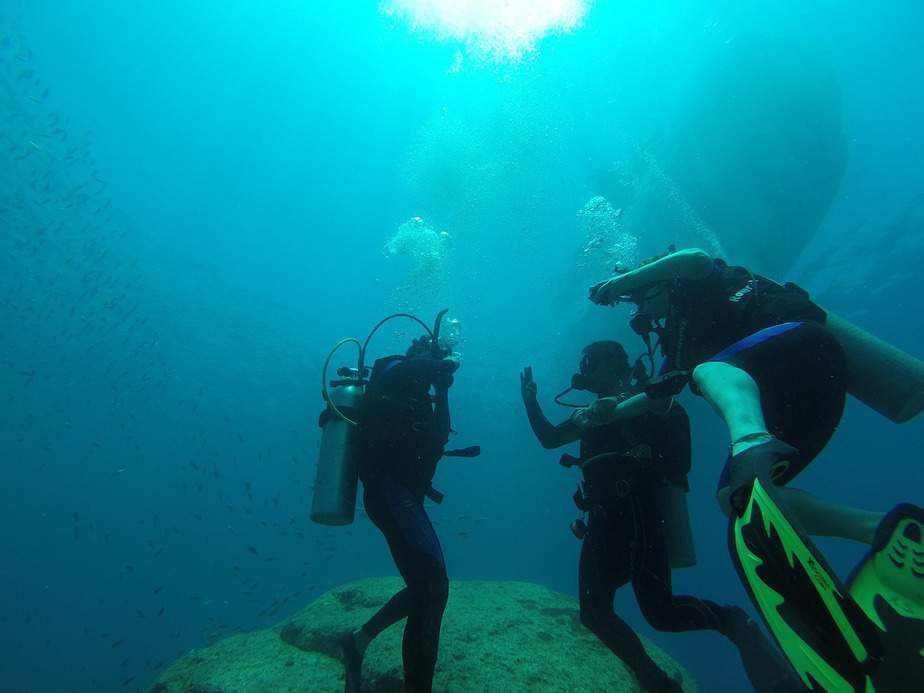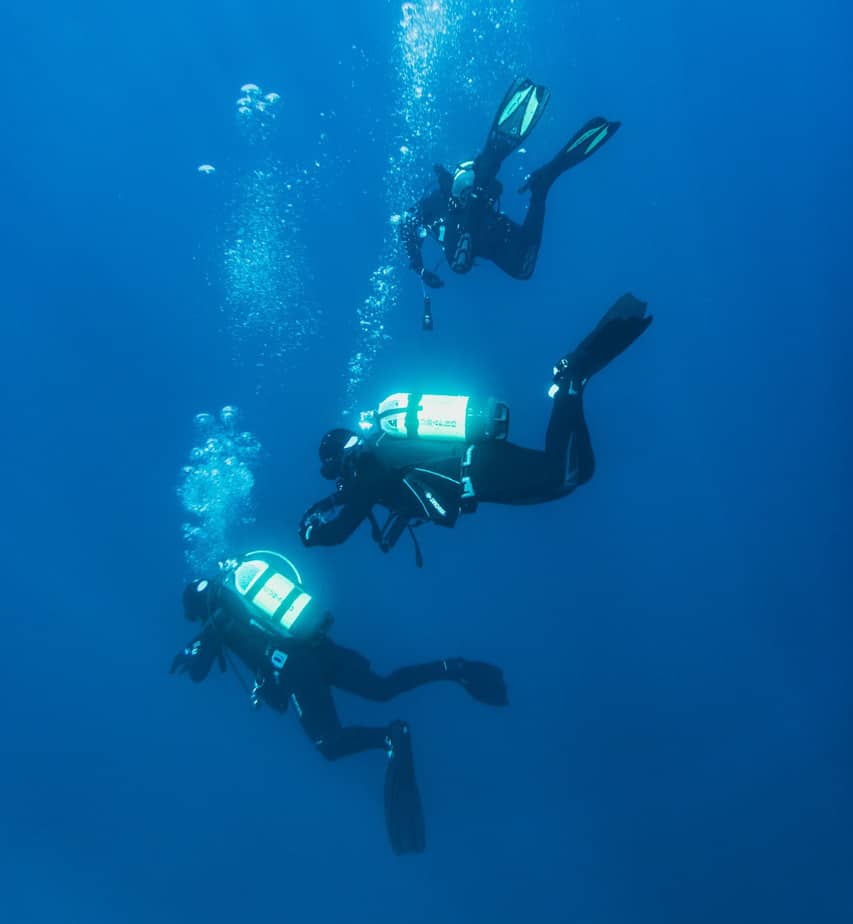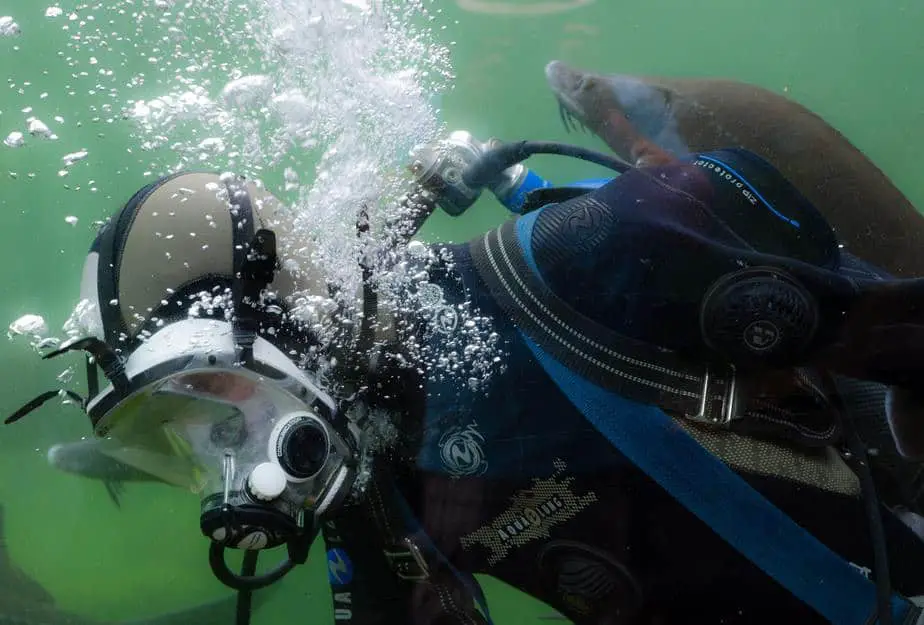Scuba diving may be nerve-wracking for the first few dives, however once you’re used to it, it can be one of the most relaxing and calming activities you can do. In fact, it’s often used as a tool for disabled veterans to treat their PTSD and many divers find that it helps clear their mind. Some divers have wondered, wouldn’t it be even more amazing if you could combine scuba diving with their favorite chill-out tune for the ultimate laid-back diving experience?
While this seems like an interesting idea, unfortunately it’s not very practical because of technological limitations as well as safety concerns. We’ve already written about why it’s not a good idea to wear regular ear plugs for scuba diving, and wearing in-ear headphones has similar issues. In this article, we’ll discuss the viability of listening to music while scuba diving, why we don’t think it’s ideal, and what the limitations are if you still want to try it out.
Why you shouldn’t listen to music while scuba diving
While it’s true that scuba equipment is improving frequently and innovations are happening year after year, unfortunately there hasn’t been much advancements in the field of scuba diving music, if any. It’s a shame, you might be wondering. After all, the feeling of getting away from it all is one of the reasons why some divers dive, so adding music seems like a step in that direction.
As we mentioned, there are technical limitations to this, however even assuming that were possible, there are some practical reasons why it’s not a good idea either.
It’s distracting
This might seem like a contradiction, but scuba divers should be situationally aware while relaxed. This is because the sport of scuba diving demands at least some focus and concentration so that you do not make a fatal mistake like not noticing danger ahead or ascending too quickly.
If you add music to the mix, it’s yet another distraction that can cause the diver to miss an important detail. There’s already issues sometimes where divers get too focused on observing wildlife that they lose track of time. A diver who is preoccupied with music might not see a developing situation that could worsen.
For example, the current might suddenly pick up and sweep them away or they run low on air without realizing it. When you’re distracted, you’re also more likely to lose contact with your dive buddy which is grounds for ending a dive due to how much of a risk it is to dive alone.
It makes communication difficult

There are three ways divers can communicate with each other while diving:
- Touch: If you’re close enough to a diver, you can just make physical contact. You can still communicate this way if a diver were listening to music.
- Sight: Even while listening to music while diving, you could still communicate via hand signals or by using your dive torch. Not that big of an issue either.
- Sound: However, communicating by sound via tapping the tank or rattling is going to be significantly harder with music playing.
While dive etiquette suggests that dive buddies should stick close to each other, divers are rarely in such close proximity that they can reach out their hand to tap their buddy on the shoulder.
Communicating using visual methods has its limitations as well because a diver’s vision is partially obscured by his dive mask, making tunnel vision a real concern. Plus, there’s also the fact that sometimes divers have to get up close to look at something, further decreasing their field of view. One way to partially solve this problem is to wear a frameless dive mask or to wear a mask with side view windows.
If communicating via touch or sight has such big problems, that leaves only communicating with sound. This is usually the way divers get the attention of their dive buddy under normal circumstances. Whether it’s by a divemaster banging on their tank or rattling, or a buddy alerting you that they’re low on air, making some kind of noise is the easiest way to get one’s attention.
In the context of this article, if you were listening to music on a dive, there is a high chance you’ll miss when a diver is trying to tell you something. There’s already a risk of you not hearing your dive buddy due to the noise of the bubbles when you exhale using a regulator, so you don’t want to make matters worse.
It can disturb others
Despite noises sounding muffled underwater, sound actually travels faster and louder underwater. Thus, if you were able to listen to music underwater, there’s a possibility your music could travel far and disturb not just the other divers, but the wildlife as well. When diving, peace and quiet is necessary to have a relaxing experience, plus you don’t want to scare away the fish.
And, as we discussed above, listening to music makes communicating via sound more difficult. It may even affect other divers’ ability to communicate with their dive buddy. So if you don’t want to earn the ire of everybody in your dive group, you might not want to be blasting music underwater.
It’s not necessary
A mistake that beginner divers make is they bring too much equipment. The extra gear adds so much bulk and weight to their kit that it becomes hard for them to maneuver. Veteran divers know to bring only the essentials to streamline their profile.
That’s why some divers don’t dive with a snorkel, for instance, because they calculated that the marginal benefits are not worth the extra bulk. The same can be said of a hypothetical scuba diving music delivery system, be it an in-ear headphone or underwater speakers.
Anything that does not aid in your survival is generally considered a waste of space and an impediment to efficient scuba diving. Furthermore, the design of modern music devices, such as the wired or wireless in-ear headphones, are not good for scuba diving.
If it is wired, you are adding yet another cable to your kit that can get tangled or yanked on. If it is a wireless earbud, it can fall out. Obviously these designs are not suited for scuba diving, so a new design might be necessary.
The optimal design would probably be something like a full-face dive mask with built-in speakers, but then you’d also have to find a way to power the speakers, you’d need a device that stores your music library, and you’d need a way to pause/play as well as skip songs. As it stands, a device that could do that seems like it’d be too bulky and an impediment to efficient and enjoyable diving.
Is it even possible to listen to music while scuba diving?

Up to this point, we were operating under the assumption that there was a fully functioning music device that could be used underwater. However, there currently isn’t something like that available, at least not commercially. In order for there to be a mass-produced scuba music device, that piece of equipment would need to overcome some challenges to become a reality.
Depth limits
There currently are waterproof MP3 players and No products found. that can be used at the surface of the water for surface water sports. Their water resistance is nothing special; only IPX8 which means it can be used underwater at a depth of 1 m for up to 30 minutes. Not good enough, since even a recreational Open Water diver can reach a maximum depth of 18 m (60 ft).
Compare this to something like an ISO-6425 rated dive watch which is waterproof up to 100 m (300 ft). A scuba device like this can go with you all the way and chances are its depth limit exceeds yours; the music listening device would have to be at least this reliable.
Furthermore, if the scuba music device is shaped like an in-ear headphone, then you are putting yourself at risk of an ear barotrauma injury. The device would plug up your ears and make it hard to equalize which can lead to a burst eardrum.
Regardless of what the manufacturer’s ratings are, in-ear headphones are not suitable for diving simply because of their design. Thus, even if there were an MP3 player that could also withstand the pressure at depth, you’d still need a music listening solution.
Waterproof phone cases
Waterproof phone cases exist that you can use for recreational diving without leaking, however they are designed for taking pictures. Theoretically, you could just as easily go to your music app and try to blast the music from the built-in speakers through the phone case and into the water.
We’d imagine the sound you heard would be so muffled and awful that it probably defeats the purpose if you wanted a calm diving experience. Not only that, but you’d make the other divers angry and scare away all of the fish.
Keep in mind that if you want to dive with a waterproof phone case, make sure the design is a durable, rigid housing, not some kind of “flexible bag” that you have to seal up. The bag design will trap some air which will get compressed at depth. This will subject your phone to extra pressure and potentially crack the screen or break the phone.
Music listening solutions not available to the public
For those wondering about how to listen to music while scuba diving, technically, the technology does exist already. However, it’s available only to commercial divers who are wearing a full face dive mask or a diving helmet with a communication system inside, including a microphone and speakers.
The downside of this solution is that the helmet is tethered to a boat at the surface which restricts where you can go and adds significant drag. We don’t know what quality the sound plays at, but we doubt it’d be able to satisfy the audiophile in you. If you want access to this technology, you’d have to be a commercial diver for a private company; currently, nothing like this is for sale.
Essentially, there are currently no viable options for divers to listen to music while scuba diving. All current solutions are woefully inadequate or not available to the public. Plus, there are some legitimate issues about social and safety concerns which the underwater music device must address in order for it to be a viable option.
Will we be able to listen to music while diving in the future?
It depends how far into the future. We do not think there will be any good solutions in the near future because it’s not a priority. Scuba diving can be a dangerous sport if you’re not careful, and divers are trained to take safety seriously. Until a solution comes out that can satisfy all of the safety requirements a diver has, then it’s not a viable product.
Obviously, over the years and decades we do expect innovative products to keep being made, however we just can’t imagine the day when an underwater music device would be marketed widely. There would have to be an advancement in underwater communications via microphone and speakers for it to eventually be repurposed and rebranded as a music device.
While an underwater music device seems like a good idea when you first think about it, upon further thought, you’ll realize that it has social, safety, and practical issues. At this time, listening to music while diving is difficult for the average person, and most certainly inadvisable.
If you want to relax more during a dive, then we recommend focusing on breathing techniques to calm your heart rate and conserve air. If you want music, listen to it from the dive boat or on the trip to the dive site, but not while you’re underwater!
Last update on 2024-03-20 / Affiliate links / Images from Amazon Product Advertising API


